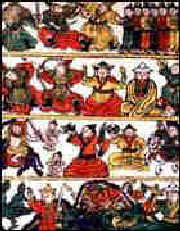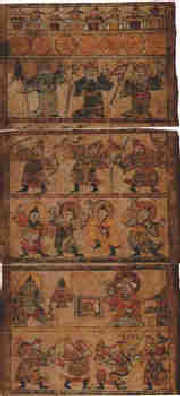|

Scroll paintings, the third kind, blended the painting arts of Naxi, Han and Tibet people. Scroll paintings are, as the name implies, long, multi-piece, or single-piece scroll paintings. In the ancient times, Dongba artists painted on flax, and later on calico. Sometimes, paper was also used. Compared with the above two types, scroll paintings are more accurate in design patterns, and richer in tableau (picturesque presentation) with golden or silvery lines sketched sometimes.
Card paintings, the fourth kind, were done in different forms. Some card paintings were done with bamboo pens, and so were also referred to as "bamboo pen paintings." Yet there were also some colored ones done with a brush. A few of these paintings were done on paper flags, which were used for funerals.

Of all the Dongba paintings, "The Road to Heaven" is the most famous one. With a length of over 14 meters and a width of 26 centimeters, it is consisted of four parts: the hell, the human world, the nature and the heaven, vividly depicting more than 300 figures and dozens of rare animals and birds. Featuring bright colors and vivid characters, the piece, while bearing the influence from Tibetan painting art, also boasts the styles and characteristics of traditional Naxi painting.
"The Road to Heaven" was mostly used at funerals to release the deceased people's souls from purgatory. The painting displayed the scenes of the souls going through the hell, the human world, the natural world and the heaven. It has been considered a piece with high cultural and artistic value.
In recent years, a contemporary Dongba painting school has appeared in China's painting circles, mainly consisting of the young and middle-aged Naxi painters. While inheriting the quintessence of Dongba painting art, the painters strive to look at this ancient ethnic group and the culture of its people from a new perspective. The result has been the creation of numerous pictures with a fresh flavor of the times and a strong ethnic touch. Both bold and expressive in their techniques of expression, the contemporary artists are able to create pictures with rich connotations, vividly exhibiting the age-long history and unique customs as well as the love and life pursuits of ancient Naxi people.
Dongba paintings have aroused the interests of the painting circles both home and abroad because of the Naxi people and their religion and just because of the paintings themselves.
|



